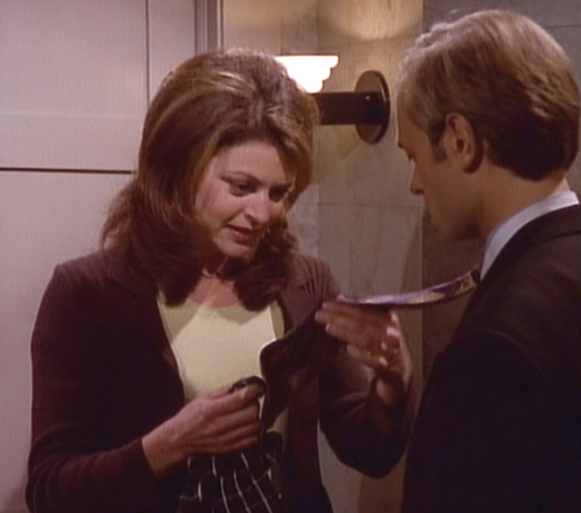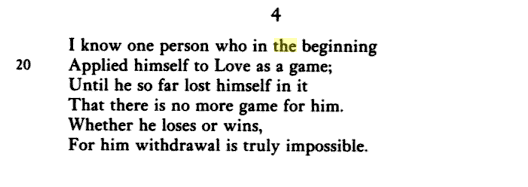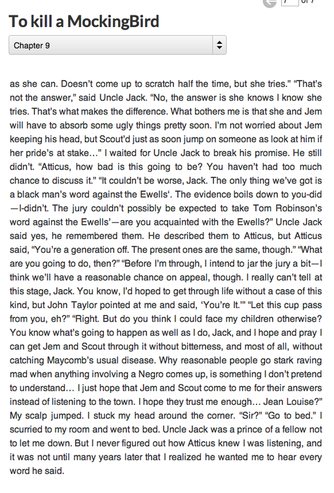Is it just me, or does anyone else feel compelled to sing "My Favorite Things" from The Sound of Music? Okay, seriously now...
Three of the items of my favorites list that have been influenced by the Bible are the sitcom Frasier, the poem "Playing the Niggard," and the book To Kill a Mockingbird. All of the Biblical influences on these works come from the New Testament, but more specifically, they come from the Gospels. These Biblical literary techniques also have to do with the sayings and mission of Jesus Christ.
Three of the items of my favorites list that have been influenced by the Bible are the sitcom Frasier, the poem "Playing the Niggard," and the book To Kill a Mockingbird. All of the Biblical influences on these works come from the New Testament, but more specifically, they come from the Gospels. These Biblical literary techniques also have to do with the sayings and mission of Jesus Christ.
In the third season of NBC’s television sitcom Frasier, one episode deals with love at its funniest. Frasier’s brother, Niles, is so obsessed with Frasier’s housekeeper, Daphne, that he is willing to go to extreme measures to keep other men away from her so that he can have Daphne to himself. In episode five, while Frasier and Niles move their father’s tattered recliner to prepare for their distinguished wine club meeting, they notice a scratch on the floor, which causes an avalanche of repair work to ensue. After Frasier hires a hunky, muscular building contractor to repair his apartment, Niles is outraged and heartsick when an instant chemistry arises between Daphne and the contractor, Joe. During the course of the episode, Frasier reveals that Niles has a nosebleed every time he lies; so it is no surprise to viewers that Niles’s nose begins to bleed when he falsely tells Daphne that Joe seduces all the women for whom he works. Several lies and buckets of blood later, Frasier learns of Niles’s lies and advises him, “Only the truth shall make you clot.” A YouTube video of this particular scene does not exist, but this link leads to the full episode, and the selected scene occurs approximately between 16:00 and 18:00.
Frasier alludes to John 8:32: “And you shall know the truth, and the truth shall make you free.” Because the Bible has such an influence in our culture, whether or not a person has read the Bible, he or she can probably confirm that the saying “the truth shall make you free” comes from the Bible. Just as Jesus told his followers that they would be set free from sin if they abided in His word, Frasier tells Niles that his blood will clot if he tells Daphne the truth. Appropriately enough, Daphne notices a blood stain on Niles’s tie and proceeds to wipe it off just as Niles’s tells her the truth about Joe, which prompts his blood to clot, affirming Frasier’s biblically allusive advice. After studying this allusion further, I also noticed that both Niles and Jesus shed their blood for love. Jesus was able to live again after He died for love of the world just as Niles's telling the truth because of his love of Daphne put his nosebleed to death, allowing him to live normally again. I figure that this parallel to Christ's death and resurrection was not intentionally done by the producers, but it is interesting that it exists, especially with an allusion to John 8:32 in the same episode. Without these literary features, I think the episode would lose emphasis and comedic value. Since the Bible is such a well-known and quoted piece of literare, likening Niles's possibility of freedom with the freedom experienced by those who adhere to Christ's words provides additional emphasis to the fact that Niles really needs to confess to Daphne. Also, there is a funny aspect to Frasier's twisting of the Bible's words to refer to Niles's nosebleed. It would not have been as comedic if Frasier had said, "You should tell the truth to make your nose stop bleeding."
The poem "Playing the Niggard" by Hadewijch also contains a Biblical literary technique. I am not a fan of poetry, and this poem in its entirety is not what put it on my favorites list, but I find the fourth stanza especially fascinating.
The poem "Playing the Niggard" by Hadewijch also contains a Biblical literary technique. I am not a fan of poetry, and this poem in its entirety is not what put it on my favorites list, but I find the fourth stanza especially fascinating.
Because Hadewijch was a thirteenth century writer and no biography was written about her, it’s practically impossible to find any statement that she made confirming that she was intentionally paralleling the figure of Jesus Christ. However, there certainly is a parallel to John 3:16, which states, “For God so loved the world that He gave His only begotten Son.” The person in Hadewijch’s poem is so absorbed in Love that he loses himself, much like the passionate Jesus lived, according to John 3:16, to give eternal life because He was engrossed in love. Because Jesus is the most popular and widely discussed literary character, paralleling His life and cause further stresses how far lost in Love this person in Hadewijch’s poem was. The last two lines, “Whether he loses or wins, / For him withdrawal is truly impossible,” also parallel the outcome of Jesus’s prayer in the Garden of Gethsemane when His Father denies His plea for the cup to pass from Him, making withdrawal from His ultimate fate of crucifixion impossible. Furthermore, Hadewijch uses the phrase “in the beginning,” which echoes Genesis 1:1 and John 1:1. In Genesis, “in the beginning” is immediately followed by “God,” and in his book, John explains that “in the beginning… was God.” The reference to these verses further confirm, for me at least, that Hadewijch had Jesus in mind when she wrote this stanza. If this Jesus-paralleling stanza was removed from the poem, I think some of the extent of the speaker's love would be lost because paralleling Jesus is to parallel the greatest love there is, which is to lay down a life for a friend.
Lastly, In To Kill a Mockingbird by Harper Lee, lawyer Atticus Finch is assigned to a controversial case, one in which he must defend a black man in a time of segregation. When Atticus’s brother, Uncle Jack, comes to town, he and Atticus discuss the case. As Atticus is expressing his doubts about the case and saying how he had hoped that he would make it through life without a case like this, Uncle Jack questions him, “Let this cup pass from you, eh?”
Lastly, In To Kill a Mockingbird by Harper Lee, lawyer Atticus Finch is assigned to a controversial case, one in which he must defend a black man in a time of segregation. When Atticus’s brother, Uncle Jack, comes to town, he and Atticus discuss the case. As Atticus is expressing his doubts about the case and saying how he had hoped that he would make it through life without a case like this, Uncle Jack questions him, “Let this cup pass from you, eh?”
Here, Uncle Jack likens Atticus’s case to Jesus’s famous “cup” in the Garden of Gethsemane (Matthew 26:39 and Luke 22:42). Jesus pleading prayer in the garden is so commonly known that, by using this particular allusion, Harper Lee stresses the burden that this case is to Atticus, just as the metaphorical cup was a burden to Christ. Also, by equating Atticus to Jesus just before His arrest in Gethsemane, the author emphasizes the
fact that Atticus sacrifices himself for the sins of others by fighting a racial battle on behalf of the townspeople, thereby taking their sins upon himself. Without this allusion, readers would not fully understand just how much of a burden this case is for Atticus. The case seems much more of an issue when compared with Jesus's daunting task.
In the end, I've not only been able to see how the entire Bible plays an influencial role in my
favorite things, but I've also noticed how just a few particular books like the Gospels have an influence on them. Because the story of Jesus is the most widely discussed and debated topic in our society, incorporating allusions and parallels to His life into projects of any kind make the pieces more relatable, understandable, and, in some instances, comical, like Frasier. These are just a few examples of how the Gospels have influenced some of my favorite things.
fact that Atticus sacrifices himself for the sins of others by fighting a racial battle on behalf of the townspeople, thereby taking their sins upon himself. Without this allusion, readers would not fully understand just how much of a burden this case is for Atticus. The case seems much more of an issue when compared with Jesus's daunting task.
In the end, I've not only been able to see how the entire Bible plays an influencial role in my
favorite things, but I've also noticed how just a few particular books like the Gospels have an influence on them. Because the story of Jesus is the most widely discussed and debated topic in our society, incorporating allusions and parallels to His life into projects of any kind make the pieces more relatable, understandable, and, in some instances, comical, like Frasier. These are just a few examples of how the Gospels have influenced some of my favorite things.




 RSS Feed
RSS Feed